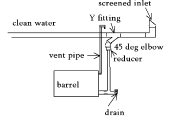
 1
1















 1
1




 1
1




S Lee wrote:as explained to me.. there are 2 or 3 tanks (prior to the last holding tank) where bacteria and aeration happens to process the waste water. The last tank has some kind of float valve/switch which will spray when full. The chlorination happens in this last tank.











r ranson wrote:
S Lee wrote:as explained to me.. there are 2 or 3 tanks (prior to the last holding tank) where bacteria and aeration happens to process the waste water. The last tank has some kind of float valve/switch which will spray when full. The chlorination happens in this last tank.
Ah. That is different than mine. Mine has two tanks where it ferments, then ooozez into the lawn to evaporate.
Not sure the answer, but I bet someone here might.
 1
1




 2
2




John Daley Bendigo, Australia The Enemy of progress is the hope of a perfect plan
Benefits of rainfall collection https://permies.com/t/88043/benefits-rainfall-collection
GOOD DEBT/ BAD DEBT https://permies.com/t/179218/mortgages-good-debt-bad-debt















 2
2




Douglas Alpenstock wrote:Does your system spray the water on the surface? The septic systems I'm familiar with use a field or mound where the excess moisture evaporates. For this kind of system, tree roots or other deep rooted plants can cause big problems. The roots will infiltrate the perforated piping and clog things up.
The best approach is to talk to a certified installer in your jurisdiction. They will be able to tell you if you can skip the chlorine injection and stay legal.
 1
1




Invasive plants are Earth's way of insisting we notice her medicines. Stephen Herrod Buhner
Everyone learns what works by learning what doesn't work. Stephen Herrod Buhner
 1
1




 2
2








Invasive plants are Earth's way of insisting we notice her medicines. Stephen Herrod Buhner
Everyone learns what works by learning what doesn't work. Stephen Herrod Buhner




Anne Miller wrote:Do you mind if I ask if your County requires a Maintenance Contract for your system?




Creighton Samuels wrote:This is a somewhat standard method of getting rid of the treated water, but you might want to inquire about possible alternatives in your locality. In particular, find out if the treated water without chlorine can be considered "greywater" and used in a greywater zone instead. Such possibilities include underground watering of trees and other "water loving" landscaping, that is quite certainly never to be used to grow food for humans (no garden irrigation). Also, the non-chlorinated greywater can never come into direct contact with humans or pets, so no more spray irrigation of the lawn. No surface pools either.




Patricia Mitchell wrote:We have a 3 tank aerobic septic system aka On-Site Septic Facilities (OSSF); it requires putting the chlorine tablets into a trap at the last (spray) tank. The system has two pumps; an aerator for the 2nd tank and the sprayer for the last tank. This type of system is required anywhere in Texas when limestone is close to the ground’s surface. In Hays County, we are required to have a maintenance contract, for quarterly inspections by septic inspector (to the tune of $300/year). The alternative is to get the license to maintain your own OSSF. I have asked around for passive alternatives and have been told either impossible or prohibitively expensive. The search continues.
 1
1




John Daley Bendigo, Australia The Enemy of progress is the hope of a perfect plan
Benefits of rainfall collection https://permies.com/t/88043/benefits-rainfall-collection
GOOD DEBT/ BAD DEBT https://permies.com/t/179218/mortgages-good-debt-bad-debt








S Lee wrote:
Creighton Samuels wrote:This is a somewhat standard method of getting rid of the treated water, but you might want to inquire about possible alternatives in your locality. In particular, find out if the treated water without chlorine can be considered "greywater" and used in a greywater zone instead. Such possibilities include underground watering of trees and other "water loving" landscaping, that is quite certainly never to be used to grow food for humans (no garden irrigation). Also, the non-chlorinated greywater can never come into direct contact with humans or pets, so no more spray irrigation of the lawn. No surface pools either.
are you saying that unchlorinated water cannot be used to water edible fruit or nut trees? if so, why not?

|
Slime does not pay. Always keep your tiny ad dry.
The new purple deck of permaculture playing cards
https://www.kickstarter.com/projects/paulwheaton/garden-cards
|





